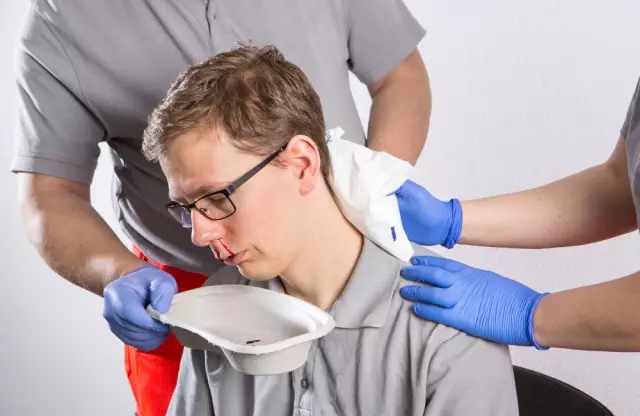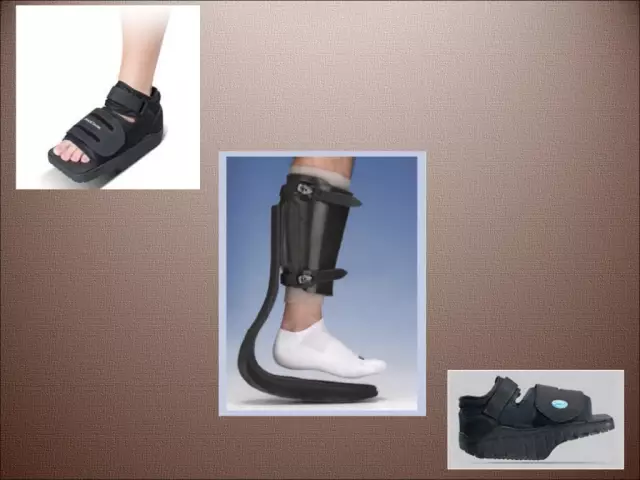- Author Rachel Wainwright wainwright@abchealthonline.com.
- Public 2023-12-15 07:39.
- Last modified 2025-11-02 20:14.
Nose bleed

Nosebleeds (the medical term is epistaxis, from the Latin epistaxis) experts do not classify as independent diseases. The root cause of nosebleeds, as a rule, is the underlying disease, traumatic or allergic damage to the nose and sinuses. Sometimes, for example, after heavy physical exertion or severe fatigue, nosebleeds can be observed in a practically healthy person. In such a case, no medical attention is required for nosebleeds. in a short time, the flow of blood from the nasal passages stops on its own.
Also, the category of non-dangerous conditions includes nosebleeds, the causes of which lie in a sufficiently long stay in the cold or in a dry, hot climate. Being in such conditions leads to excessive dehydration and drying out of the mucous membrane of the nasal passages and, as a result, becomes the cause of rupture of small blood vessels.
Causes of nosebleeds
The natural causes of nosebleeds in a healthy adult may be excessive overheating of the body (exposure to sun or heat stroke). Epistaxis resulting from overheating is usually associated with dizziness, severe weakness, tinnitus, and fainting.
Nosebleeds, the causes of which are traumatic in nature (blows, bruises, falls, etc.) are combined with pronounced swelling of the injured area and sharp soreness of nearby tissues. If there is a fracture of the facial bones or cartilage tissue, deformation is visually noticeable.
The causes of nosebleeds, consisting in inflammatory processes in the nasal passages and adjacent sinuses (sinusitis, rhinitis, frontal sinusitis, sinusitis, etc.), are usually accompanied by mucous bloody discharge with clots from the nasal passages, sometimes by increased body temperature.
If nosebleeds occur in a person suffering from chronic hypertension, then most often this symptom indicates a hypertensive crisis - a sharp increase in blood pressure, as a result of which ruptures of the walls of the smallest blood vessels in the nose occur.
The causes of nosebleeds can be the intake of certain medications, in particular, nasal sprays, anti-allergy medications (antihistamines), corticosteroids, anti-clotting drugs (aspirin, heparin, etc.).
In addition to the above reasons, nosebleeds, which occur quite often, may indicate a reduced level of platelet production in the body (the so-called thrombocytopenic purpura), as well as the possible presence of such formidable diseases as aplastic anemia or leukemia.
Frequent nosebleeds can be the only sign of an incipient benign or malignant neoplasm in the nasal passage.
Types of nosebleeds
Epistaxis in children

Features of the development of the respiratory system at an early age determine the fact that nosebleeds in children are not always caused by any pathological conditions. Most often, nosebleeds in children are caused by mechanical damage to the mucous membrane of the nasal passages - by fingers, the introduction of small foreign objects into the nose, traumatic injuries to the nose during a fall, bruise, etc.
If a child has mucus with dense bloody clots during nosebleeds, then most likely he has an inflammatory process in the nasal cavity (rhinitis, sinusitis, etc.) and appropriate treatment is required.
Prolonged nosebleeds in children, occurring constantly and combined with the occurrence of hematomas and bruises, may indicate a violation of blood coagulation processes or a hemophilia disease.
Epistaxis in pregnant women
Epistaxis during pregnancy is quite common. This fact is explained by the fact that in the body of a pregnant woman there is often a significant lack of vitamin K - an indispensable participant in blood coagulation processes. Lack of vitamin K is the reason not only for frequent nosebleeds, but also increased bleeding of the gums, as well as the appearance of numerous bruises in women during pregnancy.
If nosebleeds in a pregnant woman are accompanied by severe headache or dizziness, then this situation may be associated with an increase in blood pressure (which often happens during pregnancy) and then an urgent appeal to the gynecologist leading the pregnancy is necessary.
Treatment of nosebleeds
The provision of medical care and treatment of nosebleeds in a medical institution is required in the following complicated cases:
- profuse nosebleeds in children with suspicion of a foreign body entering the nasal passages;
- nosebleeds resulted from trauma and is combined with swelling and deformational changes in the nose;
- epistaxis occurred in a patient diagnosed with chronic hypertension against the background of a jump in blood pressure;
- frequent and profuse nosebleeds, combined with the formation of numerous bruises and bruises, bleeding gums and other symptoms of impaired blood clotting function;
- epistaxis of any etiology that does not stop when taking independent measures to stop it for more than 30 minutes.

In a hospital setting, the following manipulations are used to eliminate persistent nosebleeds:
- Tamponade of the nasal passages, in which gauze (lubricated with a special hemostatic paste or petroleum jelly) tampons are injected into the nasal cavity. Tamponade can be performed both from the side of the oral cavity (back) and from the side of the nasal passages (front);
- Prompt stopping of nosebleeds is indicated in cases where the rest of the tried measures were ineffective.
One-time nosebleeds do not require treatment. Particular attention should be paid to the state of your health if nosebleeds are repeated often enough (for no apparent reason explaining it). In this case, the best option would be to see a doctor to find out the exact causes of nosebleeds.
YouTube video related to the article:
The information is generalized and provided for informational purposes only. At the first sign of illness, see your doctor. Self-medication is hazardous to health!






